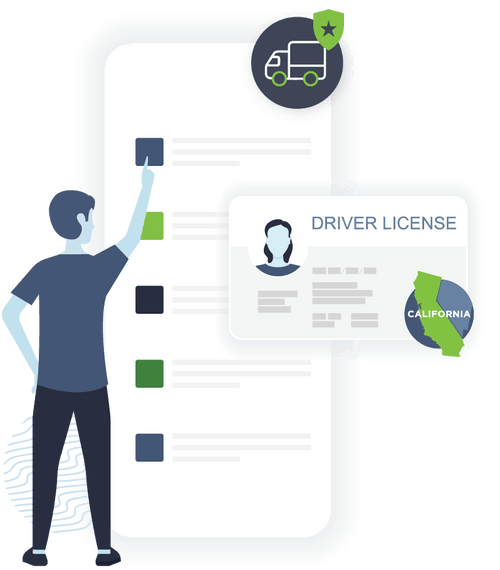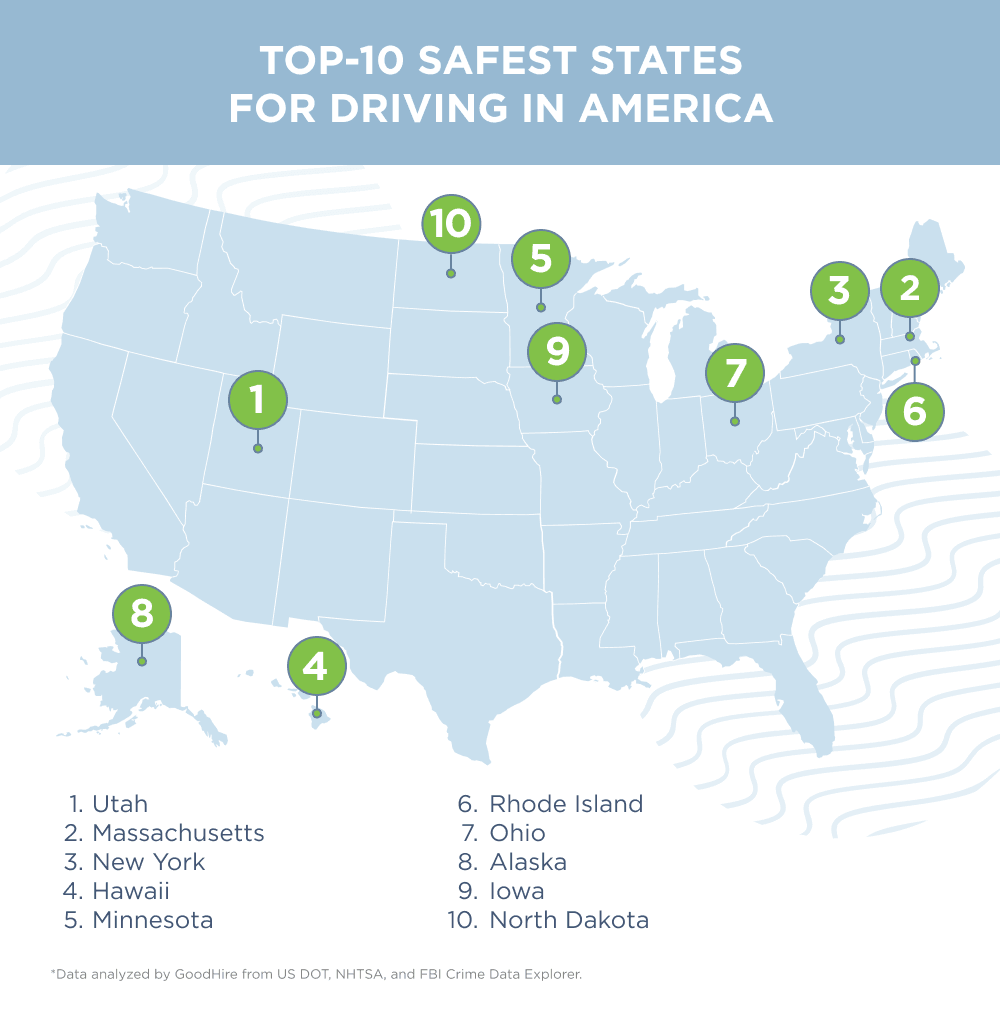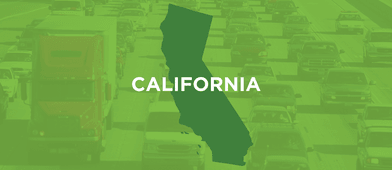MVR Checks
Driving Record & MVR Checks
Get insight into a candidate’s driving history, including license status, DUIs, and moving violations with motor vehicle records.
Trust & Safety
Why MVR Checks To Obtain Driving Records Are Critical
Reviewing your candidate’s driving records and public safety data is important for positions where employees, volunteers, or contractors will operate motor vehicles for business purposes. An MVR check provides insight into whether a candidate is a safe driver.
- Hire qualified candidates with safe driving records
- Maintain safety protocols and minimize risk
- Safeguard company assets, employees, and customers
- Maintain your organization’s reputation and trust within the community
- Protect your organization against liability claims and higher insurance premiums
Results
What Do Motor Vehicle Report (MVR Checks) & Driving Records Checks Show
An MVR report searches a state’s department of motor vehicles, or similar entity, to confirm whether a candidate’s driver’s license is valid or has been suspended, and identifies any driving-related violations. For most states, records are returned for the past three years, but some states go back five, seven, or 10 years. A motor vehicle record is checked through the state of license issuance (whichever state where your candidate holds a license), and does not show traffic violation records from other states.
- Candidate’s full name as it appears on the license
- State where license is held
- Driver’s license number
- Driver’s license status (valid, suspended, expired, etc.)
- Class (commercial driver’s license, operator, etc.)
- Felony and misdemeanor convictions (DUI, DWI)
- Moving violations, suspensions, and restrictions
Compliance
What You Need To Know When
Running Driving Record Checks
Employers using a Consumer Reporting Agency (CRA), like GoodHire, to run background checks to assess candidates during the hiring process have important responsibilities to ensure a fair and respectful process for the person, and to comply with various laws and regulations that govern employment screening. Ban-the-box compliance, targeted screens, and individualized assessments apply only when taking adverse action due to criminal records (e.g., felony convictions for DUI). Some of those laws and regulations include:
Federal Fair Credit
Reporting Act (FCRA)
You must adhere to the FCRA’s disclosure, authorization, and consent requirements. If the results of a driving records search prompts a decision to deny employment, the FCRA requires employers to follow specific adverse action steps.
Equal Employment Opportunity Commission (EEOC)
The EEOC offers recommended guidelines to conduct individualized assessments so employers can make fair, informed decisions.
Ban The Box & Fair Hiring Laws
A patchwork of state, county, and city laws move the criminal history inquiry until later in the hiring process. These laws may apply based on both the employers’ and candidates’ locations, making it tricky to know which law to follow.
Your Organization’s Hiring Policy
If your business is conducting background checks, your hiring and screening policies should be consistent and compliant to prevent discrimination and to minimize the risk of litigation and enforcement from federal agencies.
Learn More About Driving Record Checks
Employers often use driving record checks as part of pre-employment background checks. Driving record checks reveal basic information about a driver’s qualifications and driving history. Conducting a driving record check can help an employer determine a candidate’s eligibility to drive, mitigate risk, and may even be required by law for certain types of positions, such as commercial drivers.
What is a driving record check (MVR)?
A motor vehicle record check (MVR), also called a driving record check, is a type of background screening that provides information about a candidate’s driving history. Employers typically conduct MVR checks to determine a candidate’s eligibility to operate a vehicle or machinery and help companies with risk management. A driving record check may shows a wide range of information, including driver’s license class and status, accident records, moving violations, and driving-related convictions.
In certain industries, employers may be required to perform a motor vehicle record check by law. For example, companies with vehicles that cross state lines, transport hazardous materials, operate commercial vehicles, or carry passengers may be subject to specific regulations. Depending on applicable laws, such as those that exist for CDL drivers, employers may be required to perform pre-employment MVR checks, in addition to screening at regular intervals after hiring for compliance purposes.
Order Fast, Accurate MVR Reports with GoodHire
Get startedWhat shows up on an MVR check?
MVR checks for employment show detailed information about an candidate’s driving history. The available data can vary from state to state. Generally an MVR checks for employment shows the following information:
- License status: Driving records show if an individual’s driver’s license is valid, suspended, or revoked. If the driver does not have driving privileges, the report will typically include an explanation.
- License class: MVRs show the type of license a driver may have, such as non-commercial or commercial. It may also include restrictions or special endorsements. If the candidate has a commercial driver’s license, the type of class will also be shown.
- Traffic violations: Driving records often reflect many types of moving violations, from speeding to failure to yield the right of way. However, the types of entries on the report may vary depending on differences in state traffic laws.
- Accident reports: Also called crash reports, MVRs will generally show if an individual was involved in an accident along with a description of whether the incident involved property damage, personal injury, or death.
- Vehicular crimes: MVR record checks may list misdemeanor and felony offenses involving the use of a motor vehicle, including vehicular manslaughter as well as DUIs from driving under the influence of alcohol or drugs. In some states, certain vehicle-related incidents, such as DUIs, are not always reflected on criminal background checks, making MVR checks useful as part of a comprehensive background check.
When listing findings during an MVR check, many states use the MVR violation codes established by the American Association of Motor Vehicle Administrators (AAMVA). But in some cases, a state may choose to use their own coding system. In addition, MVR reports often show incidents that occurred when a driver was licensed in a different state. But since not all states share infraction data, employers may want to consider conducting additional MVR checks in states where a candidate was previously licensed. This can help ensure a more comprehensive lookin into an individual’s driving history.
How far back does an MVR report go?
MVR check lookback periods often vary from state to state, type of driving record requested, and who is ordering the report. While many states maintain records for three years, some states may keep department of motor vehicle (DMV) records for five, seven, or ten years. For example, Florida offers three types of MVRs, including a complete driving report with an 11-year lookback period. And in California, vehicle-related convictions can stay on an individual’s driving record for up to 10 years, depending on the severity of the offense. In certain states, like Texas where there are six types of driving records, a complete check goes back indefinitely.
In some, cases codes for cumulative offenses can enable motor vehicle report findings to capture traffic incidents older than their states’ record-keeping limits. For instance, in a state that reports three years of driving history, an MVR entry indicating “Three serious violations within three years” could reflect offenses as old as six years. It’s also important to note that many states limit access to certain types of record, such as complete driving histories. Often records with longer lookback periods are only available to the individual and may not be accessible by third-party background check service providers or employers. Depending on the laws in the jurisdiction of employment, employers may be able to access certain records, but not consider certain offenses that show up unless they directly relate to the role in question.
How to get MVR reports for employers
MVR checks for employers may be conducted in a few different ways. However, regardless of the method employers choose to order pre-employment driving record checks, it’s important to stay compliant with all federal, state, and local regulations.
For example, employers who partner with a consumer reporting agency, like GoodHire, must comply with the federal Fair Credit Reporting Act (FCRA). Under this law, employers must provide disclosure of your intent to conduct a background check (including an MVR check), obtain written consent before proceeding, and follow the adverse action process if you choose not to move forward with a candidate based on information found in an MVR check.
Here is a closer look at how employers can get MVR reports:
- Use an FCRA-compliant background check provider. Partnering with a third-party background check partner, like GoodHire, can help employers speed up turnaround times, provide more accurate reporting, and make it easy to conduct MVR checks in multiple states. With GoodHire, for example, MVRs from all states are delivered in a standardized format, making it easy to review results.
- Order MVRs directly from the DMV. Many states allow third parties, such as employers, to order MVRs directly from state motor vehicle agencies. While this direct state MVR service can help eliminate the possibility of document manipulation by a candidate, it can put added demands on HR staff—especially when MVR checks in multiple states are needed.
- Ask the candidate to provide a copy of their MVR. Depending on the role, employers may be able to request that the candidate provide a copy of their driving record with the job application. However, this process is not as reliable as working with a consumer reporting agency (CRA), like GoodHire, and comes with the potential risk of the candidate falsifying information. Turnaround times are also typically longer, especially when the candidate needs to obtain certified copies by mail when ordering an MVR report online is not an option.
Order Fast, Accurate MVR Reports with GoodHire
Get startedHow to check your driving record
Most states allow individuals to directly request a copy of their own MVR report online, in person, or by mail through their state’s MVR services. This type of driving record check is typically conducted through the state’s department of motor vehicles, department of highway safety, department of public safety, or similar government agency. Individuals that need a copy of their driving record can check with their state’s applicable office to learn how to get a motor vehicle report. In some cases, an individual may also be able to obtain an unofficial copy of their driving record from their car insurance company or insurance agent.
Although individuals may be able to order a more complete record of their driving history than third parties, these records are often not considered official. As a result, they typically cannot be used for pre-employment driving record checks. Employers that require a driving record background check to evaluate candidates will likely need to partner with a CRA or order the reports directly.
How long does an MVR report take?
Turnaround times for an MVR background check vary depending who is conducting the search, the types of records needed, and where the search is being conducted. In many states, it may only take a few minutes to order some MRV reports online or in person. However, some types of records, like certified MVRs, may need to be requested by mail which can often take up to a few weeks to process.
Working with a CRA, like GoodHire, can help employers speed up turnaround times and eliminate the burden on internal staff. With GoodHire, most MVR reports are available in a few hours. GoodHire also has the ability to batch MVR orders for employers that need to conduct checks on multiple candidates and can seamlessly order MVR reports across multiple states.
How much is an MVR report?
The cost of an MVR report varies depending on the type of record needed, the state where the MVR screening is being performed, and who is conducting the search. For example, a New Jersey MVR costs $15, while a driving record check in Ohio costs only $5. In some states, certified copies may have a higher fee than uncertified MVR reports.
Employers that choose to partner with a third-party provider, like GoodHire, often benefit from custom packages. For example, GoodHire offers simple pricing, volume discounts, and the ability to combine driving record checks with additional screenings, like employment verification and professional reference checks, for a more cost-effective and comprehensive pre-employment background check.
Order Fast, Accurate MVR Reports with GoodHire
Get startedWhat are the safest and least safe cities for driving?
To help businesses understand the importance of proper MVR checks and how safety on the roads can impact both employees and employers, GoodHire analyzed driving data to uncover the safest (and least safe) places for drivers in each US state.
To conduct the analysis, GoodHire reviewed data from the United States Department of Transportation’s Federal Highway Administration (USDOT), the Office of Highway Policy Information, the National Highway Traffic Safety Administration (NHTSA), and the FBI’s Crime Data Explorer. View the full report.
Get an MVR check with GoodHire
Organizations that require employees to safely operate vehicles or equipment can benefit from conducting an MVR background check with GoodHire. An MVR report provides employers valuable insights into a candidate’s driving history to help support a safer working environment for employees and customers, while also reducing potential legal risks. GoodHire offers driving record checks as part of our 100+ screening options. Plus, our built-in workflows, easy-to-use online platform, and FCRA compliance tools can help employers create a more efficient background check process with faster, more accurate results. Get started.
Order Fast, Accurate MVR Reports with GoodHire
Get startedThe resources provided here are for educational purposes only and do not constitute legal advice. We advise you to consult your own counsel if you have legal questions related to your specific practices and compliance with applicable laws.







